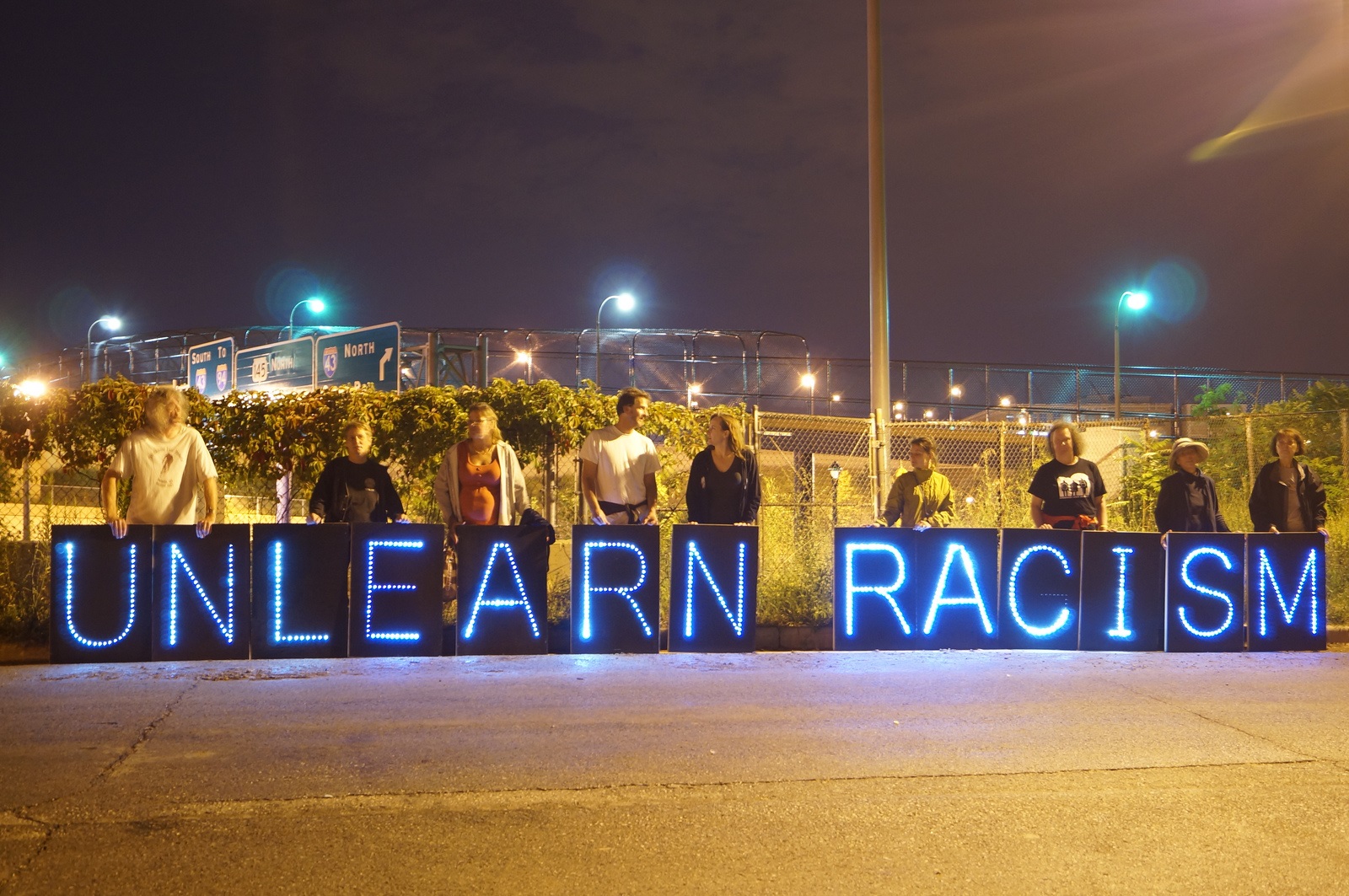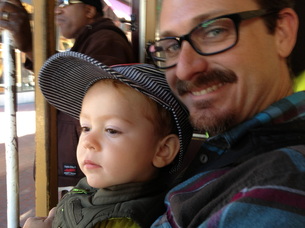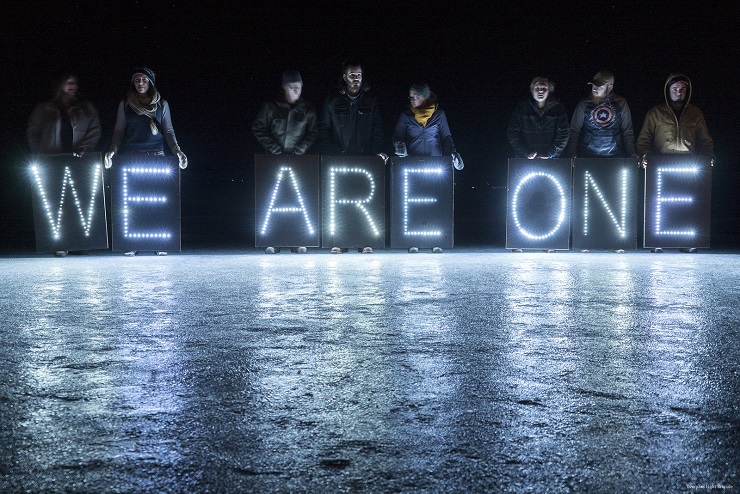
Unlearn racism by Joe Brusky Joe Brusky / Joe Brusky via Flickr CC license
Chris Crass is a longtime organizer, educator, and writer working to build powerful working class-based, feminist, multiracial movements for collective liberation. He is a one of the leading voices in the country calling for and supporting white people to work for racial justice. He joined with white anti-racist leaders around the country to help launch the national anti-racist network Showing Up for Racial Justice (SURJ), which works in white communities for racial justice. Rooted in his Unitarian Universalist faith he works with congregations, seminaries, and religious and spiritual leaders to build up the Religious Left. He lives in Louisville, KY with his partner, and their two kids. Learn more about Chris here. I spoke with Chris and Richie Schulz, Philadelphia Yearly Meeting’s community engagement fellow, on September 6th, we talked about the current political moment, organizing white folks for racial justice, and the stake white people have in that work. This is the first of four posts from that conversation. This wasn’t an interview per se, but a conversation with each of us contributing.
 Lucy Duncan: Talk with me about the current political moment, with the announcement of the ending of Deferred Action for Childhood Arrivals (DACA) program, with Hurricane Irma closely following Harvey, what are the dangers/precarities and possibilities of this moment? My own sense is that Trump is representative of the shadow of this country that’s being revealed. That makes it possible to organize against all that’s coming our way, while being incredibly brutal in the moment, too. What is your sense of what is emerging?
Lucy Duncan: Talk with me about the current political moment, with the announcement of the ending of Deferred Action for Childhood Arrivals (DACA) program, with Hurricane Irma closely following Harvey, what are the dangers/precarities and possibilities of this moment? My own sense is that Trump is representative of the shadow of this country that’s being revealed. That makes it possible to organize against all that’s coming our way, while being incredibly brutal in the moment, too. What is your sense of what is emerging?
Chris Crass: I think Michelle Alexander has really powerfully framed the political moment. She said instead of only thinking of ourselves as a resistance against Trump, step back and look at things in a broader, historical perspective. We really need to understand the fight that we’re in. In many ways, Trump and the forces behind Trump are a reaction and a resistance against the forward-moving, justice-leaning and [these forces are] against gender justice, and people’s movements like Black Lives Matter, the many ways that we’ve been fighting for a multiracial democracy, a democracy that truly reflects equality and inclusion of all people. Trump and the forces in this political moment like the neo-Nazis and the Klan, or the GOP in the House of Representatives are a reaction against the majority of U.S. citizens who really do support a broader economic justice and a broader democratic society.
It’s important to put that frame on the moment as opposed to seeing ourselves as now being on the margins and that Trump and the forces of Trump are the majority. There are very strong political forces and a very strong political power, and we’re seeing them enact the horror of Charlottesville and the way that the country responded to seeing neo-Nazis and the Klan marching. The agenda of the Klan and the neo-Nazis is being enacted day in, day out by the administration—whether it’s attacks on DACA, whether it’s talking about how the civil divisions of the Justice Department is now going to be looking at the discrimination against white people and affirmative action. The agenda of the Klan and the agenda of white supremacy is being enacted from the highest levels of political power in this country and that is devastating.
Nonetheless, it’s important for us to be able to organize and root ourselves in the expansive majoritarian politics of progressive social justice politics that have been moving our country forward for a long time and to see that what is happening now is a backlash to multiracial democracy, a backlash to the ways that our country is moving. We continue to move forward in that direction, but we have a huge fight because those forces are not going to just let go, let up.
We’re really in a major fight against these forces that are holding on and trying to squeeze every bit of life out of justice and multiracial democracy and out of this country and to hold on as a white nationalist, white supremacist society.

Lucy Duncan: I think that's right, and I’m really moved by Rev. William Barber’s contextualization of this time as the “third reconstruction.” We’ve seen this pattern before. After the Civil War and the way that Black folks and radical progressive white folks were building alternatives and more Black people were in government and state constitutions got rewritten, there was a huge upsurge in radical politics making change—and then the backlash against that occurred, and we got sharecropping and the reconstruction of slavery, rather than reconstruction of justice. There’s this real sense of last gasp, desperate holding on from the forces that grasp to white supremacy.
After the election, there were three conclusions that I came to personally. One was that there is no time to postpone joy or sorrow; we need to feel and be in our bodies right now. The second was that there is no time to waste in saying, “no” in really powerful ways to injustice. The third is that we can’t wait for somebody else to fix this for us, and we have to build the alternatives and the kinds of communities we want and not wait for someone else to do it.
I think that realizing that we have to be the shelter for one another and that nobody else is going to come and save us is a really huge awakening. I’m seeing a huge local focus and lots of experiments with trying to get what needs to be done in cities and municipalities and at the state level, too. Of course, we can’t ignore the national stage, but it seems the local context in which relationships are built is also a powerful space for building capacity and power.
Richie Schulz: The thing on my mind right now is that Antonio Gramsci quote, “The old world is dying, and the new world struggles to be born: now is the time of monsters.” I feel like that’s what we’re seeing right now. My sense is that what we need right now is to push even further left in order to respond to this, to ask for what we really want.
Related posts:
The precarity and possibility of this political moment: A conversation with Chris Crass, part 2
If this faith were a bowl, could it hold me? A conversation with Chirs Crass, part 3
Organizing white people for racial justice: A conversation with Chris Crass, part 5
